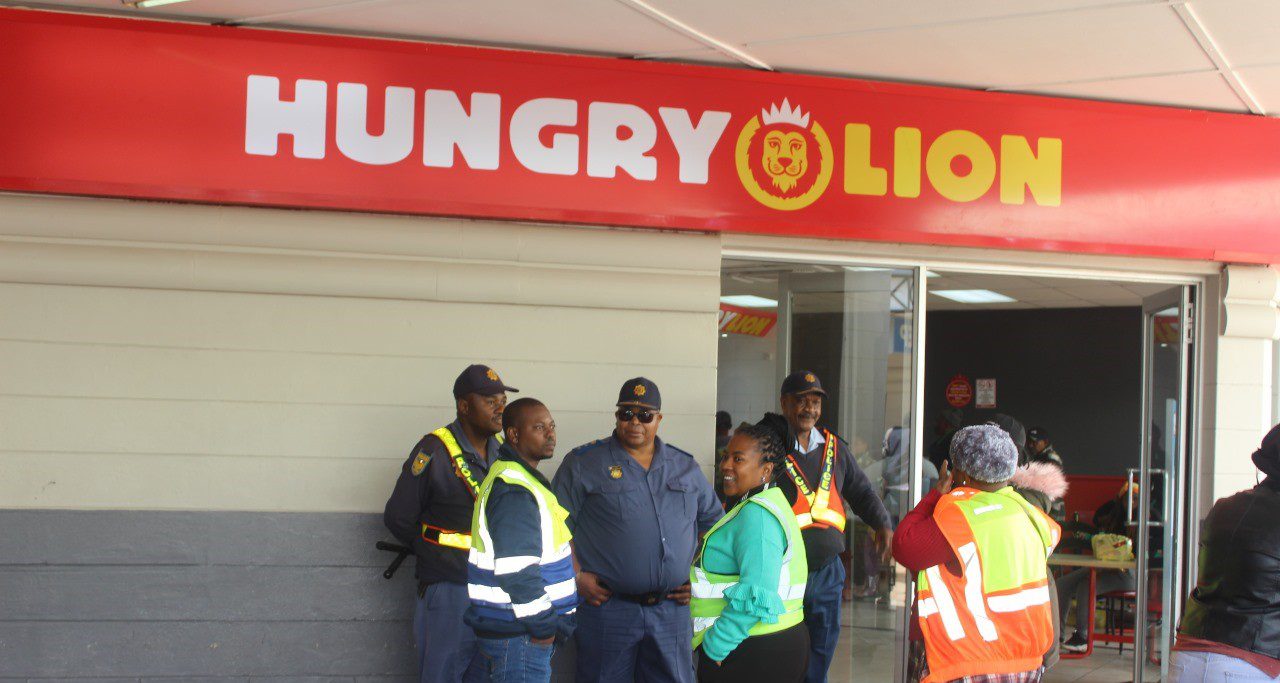By Nandipha Twani, Siphesihle Joji and Luvuyo Mjekula
Popular quick service restaurant Hungry Lion on Market Square is one of 12 Makhanda shops that have been shut down by law enforcement officers as part of the ongoing multi-disciplinary operation to ensure businesses and spaza shops comply with legislation governing the industry.
Grocott’s Mail spotted a number of hungry customers approaching the Hungry Lion shop, near Shoprite, today, but walked away in frustration. The Fish & Chip Basket in the same area was also shut down. Authorities said the two would reopen once they have all the required documentation.
The operation mostly targeted foreign-owned spaza shops, but the Makana Municipality says there are plans to go after formal businesses as well. In fact, Shoprite, OBC, Nyama Rama and others were inspected and instructed to get their act together to avoid closure in the future.
Thokozani Matiwane, the manager of OBC said she was calm about the raid because she was sure they had all the required documents. Matiwane admitted they were missing certain document and she was overwhelmed, but hoped to get all the necessary documents to ensure the store complied.
The raids have been welcomed by the wider Makhanda public.
Makana Municipality took the lead in the operation and spokesperson Anele Mjekula said in a statement that various types of expired goods were confiscated, and numerous Makhanda shops were closed as of Tuesday, 26 November, following the successful operation.
Mjekula said successes included the following:
-Twenty (20) shops inspected in the CBD.
-Twelve (12) shops closed.
-Two (2) cash loan businesses closed.
-Five (5) bakkie loads of expired food confiscated and destroyed.
-Fines will be served with non-compliance/ contravention notices for building control,
fire and town planning.
Mjekula said last week, on 20 November, the municipality and various stakeholders met with local spaza shop owners to discuss the new bylaw and its impact on the regulation of spaza shops.
The exercise was part of an effort to get owners to understand what is expected of them to run their businesses legally.
President Cyril Ramaphosa addressed the nation last week and announced decisive measures to address the recurring foodborne illnesses that have claimed the lives of many children across the country. These included the immediate closure of spaza shops implicated in the deaths and stricter regulations to protect communities.
* Business premises searched for illegal activities and compliance with by-laws.
* Checking businesses and confiscating counterfeit goods.
* Illegal power connections.
* Possession and dealing in drugs
He explained that to register, spaza shop owners need to do the following:
* Completed business license application (available at the LED Department)
* Certified copy ID or passport of the applicant
* CK document (if one doesn’t have that a tax clearance certificate)
* Copy of lease agreement (if applicant doesn’t have a lease then a consent letter
from the landlord)
* Application fee of R524.70.
* If the applicant is a foreign national they must have proof of legal papers to be in
the country.
“It is the responsibility of the business owner to ensure that the premises in which the business is operating adheres to all municipal bylaws and all other laws of the country. These inspections will also be conducted in formal businesses,” he said.
There is concern that during the festive season, people will go out to buy food in bulk in preparation for the holidays.
The event was led by the Makana mayor Yandiswa Vara, public safety and community services MMC, Cllr Thandolwethu Vayo, Local Economic Development and Planning MMC, Cllr Mzobanzi Nkwentsha, as well as Makhanda police station commander, Lt Col Mbulelo Phika.
Stakeholders that participated in the operation were Makana Local Municipality: traffic officers, fire officers, health inspectors, building control, town planning, LED – business compliance; Saps; home affairs; Sarah Baartman consumer rights and the department of economic development, environmental affairs and tourism (DEDEAT).
Mjekula said the operation will continue until all local businesses comply with the necessary regulations and ensure their businesses are up to the required standards.


